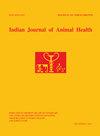Formicidae Faunal Succession on Buried Rabbit Carcass: Implications for Forensic Entomology
IF 0.5
4区 农林科学
Q4 AGRICULTURE, DAIRY & ANIMAL SCIENCE
引用次数: 0
Abstract
Background: Buried carrion can help in forensic investigation cases in determining the post-burial-interval (PBI), movement of the body or hiding of the crime. The current study aims to determine the succession of ant species on rabbit carcass buried in an outdoor habitat of the King Saud University, Western Riyadh, Saudi Arabia. Methods: In the present study, twelve rabbits were buried at 20 cm and twelve at 40 cm in two different periods. After 10, 20, 30, 40, 50, 60, 70, 80, 90, 100, 110, and 120 days, one cadaver from each depth was unearthed. Results: We have found 8 species of Formicidae, 4 types at a depth of 20 cm and two types only at a depth of 40 cm in the first period, while two types were found at a depth of 20 cm and one type only at 40 cm in the second period of the experiment. In the first period of the experiment, Cataglyphis holgerseni (Formicinae) and Cardiocondyla sp. (Myrmicinae) were the most prevalent species at depths of 20 cm and 40 cm, respectively; however, in the exposed carcasses, Messor ebeninus (Myrmicinae) predominated in both study periods. While no specie dominated the buried bodies in the second phase, as the numbers were very few in the second period on buried carcasses. In this study, many Formicidae species that correlate to different stages of corpse decomposition that were previously unknown from buried bodies in Saudi Arabia were recorded. Therefore, it is important and may have consequences in medicolegal issues.埋兔尸体上的虫科区系演替:法医昆虫学意义
背景:埋葬的腐肉可以帮助法医调查案件,以确定埋葬后的间隔(PBI),尸体的移动或犯罪的隐藏。目前的研究旨在确定埋葬在沙特阿拉伯利雅得西部沙特国王大学户外栖息地的兔子尸体上蚂蚁物种的演替。方法:在本研究中,12只兔子在两个不同的时期分别埋在20厘米和40厘米处。在10、20、30、40、50、60、70、80、90、100、110和120天后,从每个深度挖出一具尸体。结果:第一期共发现蚁科8种,其中4种在20厘米深度,2种仅在40厘米深度;第二期共发现2种在20 cm深度,1种仅在40cm深度。在实验的第一阶段,在20厘米和40厘米的深度,Cataghlyphis holgerseni(Formicinae)和Cardio髁突菌(Myrmicinae)分别是最常见的物种;然而,在暴露的尸体中,在两个研究期间,麦穗藻(Myrmicinae)占主导地位。而在第二阶段,没有任何物种主宰着被埋葬的尸体,因为在第二时期,被埋葬尸体的数量很少。在这项研究中,记录了许多与尸体分解不同阶段相关的蚁科物种,这些物种以前在沙特阿拉伯的埋葬尸体中是未知的。因此,它很重要,可能会对法医学问题产生影响。
本文章由计算机程序翻译,如有差异,请以英文原文为准。
求助全文
约1分钟内获得全文
求助全文
来源期刊

Indian Journal of Animal Research
AGRICULTURE, DAIRY & ANIMAL SCIENCE-
CiteScore
1.00
自引率
20.00%
发文量
332
审稿时长
6 months
期刊介绍:
The IJAR, the flagship print journal of ARCC, it is a monthly journal published without any break since 1966. The overall aim of the journal is to promote the professional development of its readers, researchers and scientists around the world. Indian Journal of Animal Research is peer-reviewed journal and has gained recognition for its high standard in the academic world. It anatomy, nutrition, production, management, veterinary, fisheries, zoology etc. The objective of the journal is to provide a forum to the scientific community to publish their research findings and also to open new vistas for further research. The journal is being covered under international indexing and abstracting services.
 求助内容:
求助内容: 应助结果提醒方式:
应助结果提醒方式:


